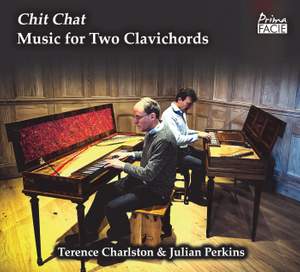How often does one encounter the rich sonority of two clavichords on two superb historical instruments? This project celebrates this rare and enchanting medium with a range of works written specifically for Terence Charlston and Julian Perkins by acclaimed composer-performers Iain Farrington and Heloise Werner, in addition to works by Alexander J. Blustin, Peter Maxwell Davies, Nicola LeFanu, Timothy Roberts, Peter Thorne, and Charlston himself.
Following their successful performances and online videos, Terence and Julian have committed this repertoire to disc - not least to encourage more people to discover a new world of sound. The music ranges in style from New Orleans Jazz to atonality with occasional forays into modern takes on old(er) styles. Special techniques are sometimes used to conjure up unusual sounds, such as the use of cloth wedges to strum the strings and fingers pressed against the strings to create plucking effects. While blend is important, each clavichord has a distinctive voice that enables the performers to have a musical chit-chat. Further colour is provided by the use of an unequal temperament that still allows the music to venture into distant harmonic realms.
Terence Charlston is a performer on historical keyboard instruments, especially the clavichord which has become a focus of his recent concerts and recordings. He is Professor of Harpsichord and Chair of Historical Keyboard Instruments at the Royal College of Music in London.
In June 2023, Julian Perkins released Handel's Attick, his fourth solo clavichord recording. Based in the UK, he is the Artistic Director of the Portland Baroque Orchestra in Oregon, USA. He enjoys combining this role with that of Artistic Director of Cambridge Handel Opera and the period-instrument ensemble Sounds Baroque, in addition to his activities as a solo keyboardist/duettist, chamber musician and director.
The recording features two unfretted clavichords by two renowned makers: one based on an instrument from about 1775 by Johann Heinrich Silbermann and made by Peter Bavington in London; the other based on one by Johann Emanuel Schon, 1748 and made by Andreas Hermert in Berlin.
The inspiration for this collaboration came from Peter Maxwell Davies' Four Lessons for Two Keyboards, an original clavichord work written in 1978. The recording also includes Maxwell Davies' popular modern classic, Farewell to Stromness, in an original arrangement for two clavichords.
Iain Farrington's jazz-influenced suite Chit Chat (commissioned with the support of the British Clavichord Society) evokes lively conversations in its outer movements with colourful harmonies and ebullient rhythms, while the middle movement has a relaxed and smoky atmosphere.
The composition of Heloise Werner's a many-layered object evolved creatively between the performers and composer, bringing fresh sounds and new playing techniques which are integral to its performance style.
Special playing techniques also feature in Terence Charlston's Five Pieces for Two Clavichords, a complex and stylistically diverse response to Maxwell Davies' Four Lessons.
The three Broadwood Bagatelles by Nicola LeFanu are solo character pieces which showcase the special qualities of each clavichord alone.
The Fractal Ground by Timothy Roberts is based on Henry Purcell's sublime Evening Hymn recomposed as if 'half-remembered in a dream', a reworking of Roberts' original vocal version for two clavichords.
Peter Thorne's Dap Dap Da Da Dap takes a simple but compelling theme which is constantly restated and developed with hints of twentieth-century popular music and jazz.
Alexander J. Blustin's Idle thoughts of owls depicts owls watching in the trees, hunting their prey, and gliding into the night. It is based on a poem by the composer.
Credits:
Recorded and produced by Steve Plews
Recorded at the Old Rectory, Yardley Hastings, Northamptonshire on 6-8 February, 2023
Edited and mastered by Phil Hardman





